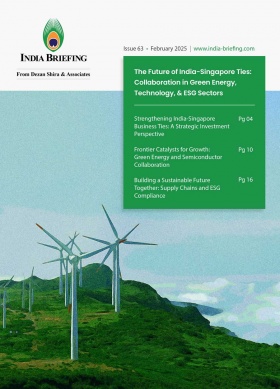India’s AI Infrastructure and Emerging Market Leadership: An Outlook
With India emerging as a global hub for AI and data centers, new policies, investments, and international reports underscore its digital infrastructure potential and challenges.
India is swiftly establishing itself as a key player in the global digital economy, fueled by progress in artificial intelligence (AI) technologies and the expansion of its data center ecosystem. This momentum is being driven by favorable initiatives, growing foreign direct investment (FDI), and rising demand for digital services.
By 2024, India had secured more than US$60 billion in data center investments, with projections indicating this figure could exceed US$100 billion by 2027. Concurrently, India’s AI sector is anticipated to contribute around US$400 billion to the national economy by 2030.
The United Nations Conference on Trade and Development (UNCTAD), in its Technology and Innovation Report 2025, provided a detailed overview of India’s growing role in the global AI landscape.
Investment and market performance
India’s data center industry, valued at US$10 billion in FY 2023-24, has witnessed a 139 percent capacity growth since 2019, rising from 590 MW to 1.4 GW. According to industry insight reports, capital deployment in this sector totaled US$4.2 billion in March 2024, comprising US$2.6 billion in equity and US$1.6 billion in debt. Projections estimate that cumulative investments could exceed US$100 billion by 2027, driven by surging demand from AI workloads, mobile usage, and cloud services.
The most active markets include regions such as Mumbai and Chennai, accounting for 70 percent of total installed capacity. Mumbai alone represents nearly half the country’s IT power capacity. Other notable hubs include Noida, Bengaluru, Hyderabad, and Pune. In the last five years, nearly 440 acres of land have been acquired for hyperscale centers, with Hyderabad leading with 69 percent of acquisitions.
AI infrastructure and sustainability
On March 7, 2024, the central government approved INR 107.3 billion (US$1.24 billion) for AI-specific data center infrastructure, marking a shift toward AI-ready infrastructure. These facilities are designed to support high-density workloads, incorporating technologies like liquid cooling, floor loads up to 2,500 kg/m², and energy-efficient architecture. As generative AI is forecast to contribute US$400 billion to India’s GDP by 2030 at a compound annual growth rate (CAGR) of 28 percent, next-generation data centers will be critical to powering the growth of data centre.
Edge data centers are now emerging in tier-2 and tier-3 cities like Jaipur, Kochi, Vishakhapatnam, Bhubaneswar, and Patna. These smaller, decentralized centers reduce latency, improve response times, and enable real-time processing for AI, Internet of Things (IoT), and 5G applications.
India also aligns its digital growth with its carbon neutrality targets. With a goal of 500 GW of installed renewable energy by 2030 and net-zero emissions by 2070, private operators like AdaniConneX are investing in 100 percent green-powered data centers across major metropolitan regions in the country.
Indian states compete for AI data centres
The central government policies, such as allowing 100 percent FDI under the automatic route, have attracted global players like AWS, Microsoft, and NTT to India. According to NASSCOM, India is expected to attract US$5 billion in annual investment in data centers in 2025 alone. States like Maharashtra, Tamil Nadu, and Telangana offer capital subsidies and tax exemptions and define data centers as essential services, further incentivizing development.
In April 2025, Andhra Pradesh signed a Memorandum of Understanding (MoU) with Google for an AI data center in Visakhapatnam. Meanwhile, Madhya Pradesh launched India’s first purpose-built AI data center, supported by policy reforms and infrastructure grants.
Municipal AI adoption also reflects the sector’s maturity. For example, Pune’s Adaptive Traffic Management System, deployed at 30 signals, has significantly improved travel times and traffic flow using AI algorithms.
Global relevance and UNCTAD findings
According to the UNCTAD Technology and Innovation Report 2025, India now ranks 10th globally in AI investment with US$1.4 billion, trailing behind leading economies such as the US and China. The country’s 13 million-strong AI talent pool contributes heavily to platforms like GitHub, underscoring India’s strength in open-source innovation. Educational institutions such as the Indian Institute of Technology (IIT) Hyderabad and IIT Kharagpur have emerged as AI research hubs.
Within the report, UNCTAD also flagged the AI governance gap, with 118 Global South countries absent from global regulatory discussions. India’s experience with inclusive AI policy, particularly through public consultations and ethics frameworks, can set a precedent for other developing economies.
In brief
With support from both the public and private sectors, India can emerge as a leader in AI infrastructure development. For global investors, the opportunities span hyperscale data centers, edge computing, sustainable energy, and AI-driven digital services. As the digital economy deepens its roots, India offers fertile ground for high-impact, long-term investments in frontier technology sectors.
(US$1 = INR 85.66)
About Us
India Briefing is one of five regional publications under the Asia Briefing brand. It is supported by Dezan Shira & Associates, a pan-Asia, multi-disciplinary professional services firm that assists foreign investors throughout Asia, including through offices in Delhi, Mumbai, and Bengaluru in India. Dezan Shira & Associates also maintains offices or has alliance partners assisting foreign investors in China, Hong Kong SAR, Vietnam, Indonesia, Singapore, Malaysia, Mongolia, Dubai (UAE), Japan, South Korea, Nepal, The Philippines, Sri Lanka, Thailand, Italy, Germany, Bangladesh, Australia, United States, and United Kingdom and Ireland.
For a complimentary subscription to India Briefing’s content products, please click here. For support with establishing a business in India or for assistance in analyzing and entering markets, please contact the firm at india@dezshira.com or visit our website at www.dezshira.com.
- Previous Article India Mulls Opening Key Government Procurement Market to Foreign Companies
- Next Article 印度人工智能基础设施建设及其在新兴市场中的领导力展望








